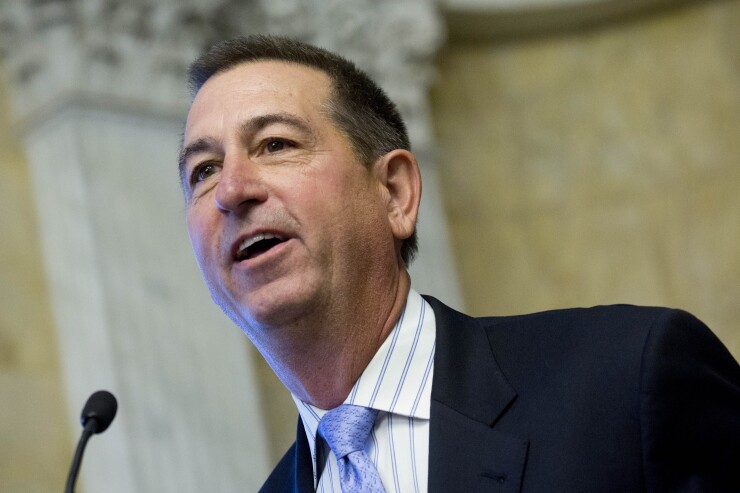The Office of the Comptroller of the Currency’s decision to move forward with a new banking charter to benefit certain lenders and money transmitters that utilize innovative technology and do not accept federally insured deposits (the so-called fintech charter) has been controversial to say the least. Both sides’ arguments have merit and acknowledging each of them points toward a way to resolve the bank wars that have bedeviled efforts to modernize regulation.
The states oppose the charter, which Conference of State Bank Supervisors President John Ryan recently called “
Comptroller of the Currency Joseph Otting

Who is right? In a way, both sides are.
The OCC is right that cumbersome state-by-state regulation of financial services often stands in the way of efficiency for national banks, consumer choice and ultimately, quality. Given the lack of geographic limitations for online financial services, we need regulatory consistency. The OCC is also right in that, while high-minded concerns about consumer protection partly motivate the states, concerns about diminished power and fees also play a role.
Conversely, the states are right that OCC fintech charter recipients would have a regulatory advantage over their state-licensed competitors that is hard to justify — as is
Likewise, nationally chartered banks do not require state licenses to transmit money. State banks, meanwhile, are largely excluded from this requirement by other states, but that is not universal. And it only applies to conventional banks and not nonbank, state-licensed money transmitters, a category that currently includes many innovative payments companies. Even if a state were to try to offer a carbon copy of the OCC charter it simply couldn’t due to federal law.
So how do we fix this?
First, states should take their grievances to Congress and argue that they should be able to offer an option that enjoys comparable powers to the OCC fintech charter, and they have a couple of options as to what that might look like.
If states want to compete within the banking system, their own “fintech” bank charter would need to approximate the powers of the OCC charter. This would require several reforms, including changing the law currently limiting interest export to only depository state banks and allowing nondepository banks to also benefit. It would also mean mandating that states grant reciprocity to other states’ banks (including nondepositories) for money transmission licensing purposes and making it easier for nondepository state banks to access the Federal Reserve payments system.
These reforms could preserve and modernize the dual banking system to accommodate new technology and business models, allowing state and nationally chartered “fintech” banks to compete on an even playing field. Such a solution would allow state-chartered fintech banks to leverage a well-established body of existing law around banking and has a pleasing symmetry.
However, there is also an argument to be made that creating a meaningful state fintech bank charter is unnecessary. While the OCC’s authority is limited to bank charters, the states are not. States already have robust licensing programs for nondepository lenders and money transmitters, which largely lines up with the firms that might consider a fintech charter. Further, there are certain legal restrictions that come with being a bank that may not be necessary or desirable for every entity. As such, another option could be to facilitate state-licensed entities to compete with OCC “fintech” banks on the basis of their home-state license, without having to become a bank.
Allowing state-licensed lenders and money transmitters to compete with OCC “fintech” banks would require changes to federal law. For example, federal law could extend things like consistent treatment of interest, reciprocity for money transmission licensure and access to the payments system to state licensed nonbank lenders and money transmitters. This would allow state-licensed, nonbank competition to the OCC fintech charter on relatively equal terms. This competition between the state and federal systems will provide consumers with more options without unnecessarily forcing every institution into the “bank” bucket.
Innovation in financial services has the potential to improve consumers’ well-being, and outdated or uneven regulation should not prevent that. The states have traditionally played an important role in financial regulation, and that should continue — but it should not impede needed modernization. Rather than stifle the potential benefits of the OCC’s fintech charter, federal laws ought to allow states to compete on an equal footing with the OCC and let the American people reap the benefits.





